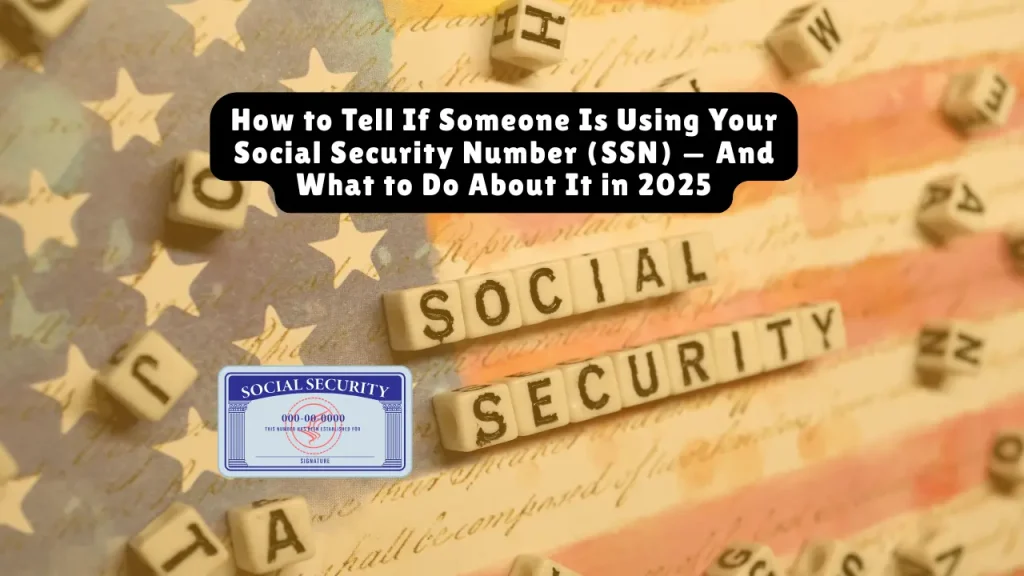How to Tell If Someone Is Using Your Social Security Number (SSN) — And What to Do About It in 2025
If someone is using your SSN, you may notice unauthorized accounts, unfamiliar tax documents, debt collection calls, or changes to government benefits. The fastest way to find out is to check your credit reports, Social Security earnings, and IRS transcripts, then set fraud alerts or freeze your credit immediately.
Why It Matters?
In 2023 alone, over 1.4 million identity theft cases were reported to the FTC, many involving SSNs. The average household loss was $1,400 (source: Investopedia). SSNs are gold to criminals—they open credit cards, file fake tax returns, collect benefits, or even apply for jobs under your identity. If undetected, this fraud can spiral into debt, legal trouble, and damaged credit.
With 69% of data breaches exposing SSNs and synthetic identity theft rising (source: 2023 Identity Fraud Study), early detection is no longer optional—it’s essential.
Table of Contents
Real-Life Example:
In April 2025, a victim’s $1,855.30 monthly Social Security benefit was hijacked after scammers leaked their SSN and login details on the dark web. Payments were rerouted to a criminal’s account. The SSA intervened by requiring in-person verification for disputed claims, a move that sparked controversy for burdening seniors and those in rural areas (source: Washington Post & SSA Newsroom).
Warning Signs Your SSN May Be Compromised
- Unexpected Mail or Debt Calls
You receive pre-approved credit offers, bills, or calls from collectors about accounts you didn’t open. - Credit or Financial Trouble
Credit cards or loans denied due to unfamiliar debts. Credit report shows accounts or inquiries you never authorized. - Benefit or Tax Discrepancies
You receive IRS notices about income from unknown jobs, or Social Security statements show benefit changes or new claims.
Step-by-Step: How to Check If Your SSN Is Being Used Fraudulently
1. Review Your Credit Reports
- Go to AnnualCreditReport.com to request free reports from all three bureaus: Equifax, Experian, and TransUnion.
- Look for:
- Unknown accounts or loans
- New addresses
- Hard inquiries you didn’t authorize
- Unknown accounts or loans
If your child’s SSN may be at risk, submit a minor inquiry or freeze request via TransUnion’s Child Identity Theft Inquiry form.
2. Check Your Social Security Earnings
- Visit mySocialSecurity.gov to:
- Verify your Statement of Earnings
- Spot any unfamiliar wage entries or benefit claims
- Verify your Statement of Earnings
If you find issues:
- Call SSA’s Office of the Inspector General: 1-800-269-0271
- File a correction request online
3. Verify IRS Tax Records
- Call the IRS Identity Protection line: 1-800-908-4490
- Request:
- Wage and tax transcripts (W-2)
- Recent returns linked to your SSN
- Wage and tax transcripts (W-2)
If fraud is found:
- File IRS Form 14039 (Identity Theft Affidavit) immediately.
4. Scan the Dark Web
- Use tools like:
- HaveIBeenPwned (free)
- IdentityIQ, Aura, LifeLock (paid options)
- HaveIBeenPwned (free)
If your SSN, DOB, or email appears, act fast:
- Re-check credit reports
- Freeze credit
- Report to FTC and SSA
5. Set Up Fraud Alerts or Freeze Your Credit
- Fraud Alert (1-year): Notify one bureau; they’ll alert the others.
- Extended Fraud Alert (7 years): If you’re a verified victim.
- Credit Freeze: Fully locks your file—no new credit can be opened in your name.
📞 Freeze hotlines:
- Equifax: 1-800-525-6285
- Experian: 1-888-397-3742
- TransUnion: 1-800-916-8800

6. Monitor Benefits and Healthcare Claims
- Medicare/Medicaid: Call your providers to review claims history under your SSN.
- SSA Benefits: Log into mySocialSecurity and check for unfamiliar payments.
Provide ID and a police report if fraud is suspected.
7. Report the Fraud
- FTC: IdentityTheft.gov for a full recovery plan
- SSA Fraud Hotline: 1-800-269-0271
- Local Police: File a report to establish a legal record
8. Secure Your Identity Going Forward
- Use Strong Passwords: Try a manager like Keeper®
- Enable Two-Factor Authentication (2FA)
- Shred Sensitive Documents
- Don’t Carry Your SSN Card
Expert Insight:
“Identity thieves don’t just open credit cards anymore—they create synthetic profiles using children’s SSNs, file fake tax returns, and steal retirement benefits,” says Eva Velasquez, CEO of the Identity Theft Resource Center. “It’s critical to monitor not only your credit but also your government accounts and dark-web activity.”
Proactive Protection Plans
Consider enrolling in comprehensive identity protection services like:
- Identity Guard
- LifeLock Family
- Experian IdentityWorks
These offer:
- Dark web monitoring
- Credit alerts
- Up to $1 million in identity theft insurance
Community Awareness & Family Education
- Teach teens to check SSA, IRS, and credit records before college or jobs.
- Hold school or PTA workshops using free materials from FTC or CFPB.
- Use templates to write to credit bureaus, SSA, or IRS (see resources below).
Resources & Templates
- IRS Form 14039 – Identity Theft Affidavit
- SSA-7004 – Request for Social Security Statement
- Credit Bureau Inquiry Letter (CA DOJ)
- FTC Identity Theft Portal
Conclusion: Act Before It’s Too Late
SSN misuse doesn’t just cost money—it destroys reputations, delays benefits, and creates long-term credit havoc. Start today:
- Check your credit.
- Set alerts.
- Freeze accounts.
- Monitor benefits.
- Report fraud early.
Your Social Security number is the key to your identity—guard it fiercely, monitor relentlessly, and act swiftly at the first sign of abuse.
About the Author

Sarah Klein, JD, is a former consumer rights attorney who spent years helping clients with issues like unfair billing, product disputes, and debt collection practices. At All About Lawyer, she simplifies consumer protection laws so readers can defend their rights and resolve problems with confidence.
Read more about Sarah
